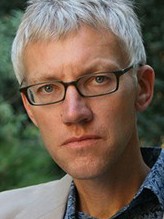
Historian Tom Holland has made a public confession that when it comes to his morals and ethics he is “thoroughly and proudly Christian”. (Tom Holland is a very talented writer and historian whose study of the rise of the Arab empire and birth of Islam I have discussed here. I was also fascinated by another work of his, Millennium: The End of the World and the Forging of Christendom — a period of history I specialized in when studying history as an undergrad.)
Now Christian blogs are crowing that the renowned historian has “come out” in defence of Christianity. The Enlightenment philosophes got the Church all wrong, he implies.
Dr. Platypus, Darrell J. Pursiful’s Bible and Faith Blog, posts Tom Holland Was Wrong about Christianity and Michael Bird on Euangelion posts Tom Holland: Why I Was Wrong about Christianity. I imagine there will be many more to follow. The excitement is over Tom Holland’s article just published in New Statesman, also titled Tom Holland: Why I Was Wrong about Christianity.
Holland tells us of his younger fascination with the great empires and generals of ancient history (an interest he says morphed out of his boyhood love of dinosaurs) and how they made the Bible’s heroes looked so anemic in comparison.
He had long embraced the view of history bequeathed us by the Enlightenment era (via Gibbon, Voltaire, etc) that Christianity ushered in an age of intolerance, superstition and ignorance. One had to look further back to the ancient “classical era” to find values more worthy of humanist ideals.
His epiphany dawned over time as he reflected upon the barbarism of Sparta and Rome:
The longer I spent immersed in the study of classical antiquity, the more alien and unsettling I came to find it. The values of Leonidas, whose people had practised a peculiarly murderous form of eugenics, and trained their young to kill uppity Untermenschen by night, were nothing that I recognised as my own; nor were those of Caesar, who was reported to have killed a million Gauls and enslaved a million more. It was not just the extremes of callousness that I came to find shocking, but the lack of a sense that the poor or the weak might have any intrinsic value. As such, the founding conviction of the Enlightenment – that it owed nothing to the faith into which most of its greatest figures had been born – increasingly came to seem to me unsustainable.
For once I can say something I have never written before and never imagined myself saying. A historian from outside the guild of biblical studies can learn something from a Professor of New Testament; in this instance the professor is Gregory J. Riley. (There are surely many others; but as an outside amateur I think of Riley as the most well known scholar addressing the contribution of ancient “classical” values to Christianity.)
Christianity was not born mysteriously out of a womb unrelated to the body of which it was a part. Every human creation is a product of a human environment. It would be unique, unnatural even, if Christianity emerged from a virgin birth.

By way of explanation I think the titles of two of the following posts on Gregory Riley’s works should tell the story, though the titles are also hyperlinked to their original content:
- Christianity won over paganism by epitomizing pagan ideals (2010, August)
- Jesus, the ideal Greek-Roman hero? (No embarrassment criterion here) (2006, December)
See also Peter Kirby’s page: Historical Jesus Theories: Gregory Riley
Then there are the scholarly works addressing Paul’s debt to classical ethics with nary a word of credit to Jesus. I mention just a handful that I can identify quickly from my own collection:
- Engberg-Pedersen, T. (2000). Paul and the Stoics. Louisville, Ky.: Westminster John Knox Press.
- Engberg-Pedersen, T. (2006). Paul’s Stoicizing Politics in Romans 12-13: The Role of 13.1-10 in the Argument. Journal for the Study of the New Testament, 29(2), 163–172. http://doi.org/10.1177/0142064X06072836
- Lee, M. V. (2009). Paul, the Stoics, and the Body of Christ. Cambridge; New York: Cambridge University Press.
- Malherbe, A. J. (1989). Paul and the popular philosophers. Minneapolis: Fortress Press.
- Rasimus, T. (2010). Stoicism in early Christianity. Grand Rapids, Mich: Baker Academic.
- Thorsteinsson, R. M. (2006). Paul and Roman Stoicism: Romans 12 and Contemporary Stoic Ethics. Journal for the Study of the New Testament, 29(2), 139–161. http://doi.org/10.1177/0142064X06072835
Julius Caesar and Leonidas were not the only figures to speak for ancient values. Seneca was ordered by Nero to commit suicide, if my memory serves.
And as for the utter callousness of Caesar’s treatment of the Gauls and Sparta’s legendary treatment of helots, yes, it would be soul-destroying to think humanity has made no progress in two thousand years. Yet we do ourselves a serious injustice if we fail to recognize that our Christian nations have on the whole fully approved the extermination of entire cities of innocents for what they believe was the purpose of saving the lives of their own soldiers, and continue to approve of the slaughter of innocents in order to achieve specific national and strategic goals.
Tom Holland might be advised to turn his attention to historians of modern realities (his compatriot Jason Burke comes to mind) and learn that enormous strides in propaganda and hypocrisy have possibly exceeded advances in morality. No, that’s not quite fair or true. It really is a lot harder today for national leaders to do what they want without regard for public opinion and I have little doubt that leaders today really do have consciences more refined than those of their ancient counterparts (except for the psychopaths, of course). But, but…. it does pay sometimes to look behind the headlines.
If you enjoyed this post, please consider donating to Vridar. Thanks!

Cake or Death?
I don’t think Christianity has been the main agent of extermination or mass murder. I don’t see it as a Dalek religion.
There is a wonderfully self-deprecating side to Christian belief (or at least Anglican belief which is the dominant form of expression in the UK) which Atheists ought to recognise.
Comedian Eddie Izzard captured this in his absurd cake or death monologue.
When I was at school, our Chaplain introduced us to ‘ungodly’ concepts such as Nietzsche, the death of God, and existentialism.
He never pushed dogma at us.
I’m an atheist, but I still believe that christian ethics are relevant to the modern world. I see the corruption and greed in FIFA , the tax avoidance industry, the banking industry and I weep.
Maybe Tom Holland can draw on his Classics background and publish a substantial critique of Richard Carrier’s OHJ.
I don’t believe there is any such “thing” or “religion” as Christianity in any meaningful sense. There are many different forms of religious beliefs and practices that adherents and outsiders call Christian because they share common symbols, stories and texts.
People may claim that their ethics are Christian or Muslim of Buddhist or whatever — but that’s just the packaging for what are human ethics for most part. Everyone believes in honesty and justice, being kind to strangers, etc — at least in theory or as ideal aspirations — whether Christian or not.
Christian ethics did not suddenly originate out of the clear blue sky with the words of Jesus. The ethics of the Bible were drawn from the ethics known and prized in the ancient world. Some of those ethics have moved with the times as society learns more about human nature and behaviour.
I didn’t read the links so I may not be understanding what’s said here — quite possibly — but I believe Holland’s main point is not really about ethics or even if anybody had articulated virtues that are now considered mainstream — and put those in the mouth of Christ. Maybe there was an ancient civilisation that saw slaves, women, children, the disabled, the elderly and the conquered as equally valuable as the strong, intelligent, demonstrably fit and, moreover, preached a deity that so identified with the unfit as to take their place in public humiliation, defeat and protracted suffering but the people of the time, Jewish, Greek or Roman certainly experienced such a notion as a somewhat revolutionary and/or absurd. Moreover, the Christians argued that that Unfit God came back to life, or in other words, was God, the source of all existence. The Unknown God was the Unfit God, or god of the unfit. The Hebrew god, who called himself, Existence Itself, was not characterised primarily by strength, power or even stellar I.Q., nor even Aristotle’s admittedly admirable virtues. Possibly some ancient civilisation understood its god or gods to be loving, Idk. But that Existence, God, is Love? And love not of a kind that most of us usually experience, that is, of family members, or romance or friendships but love to the point of being tortured to death for people who hate us? That people have not been able to live up to such beliefs is no surprise and in fact, have even co opted them as excuses to exercise Force or cruelty, i.e. the old ways to rule, is true (and predictable). But the vision itself is not the same as those who fail to live it. We’ve rarely, if ever, got it right since the ancient world (and the current one) demonstrate how alien, how little innate or natural, it is to either reason, inclination or even reasonable morals.
What you describe is not Holland’s point about Christianity. Besides, I recognized in your description of the essence of Christianity the same sort of exaggeration that I used to concoct when a believer to establish some form of uniqueness about the faith — I downplayed (and now you do the same) the Christian message of judgment on the outsiders and exaggerated the “torture” side of Christ’s death. (You will find other non-Christian martyrs who were tortured to death far more viciously than Jesus.) I invite you to read some of the links to see how much Christianity had in common with the highest ethical ideals (including the notion of the highest God being love) of ancients and how compatible the life, death and resurrection of Jesus was with other heroes, gods and demi-gods.
Holland should also look at the history of Jewish and Christian violence. Including say, the moment Moses formed his priesthood from the Levite tribe. Who had just loyally slaughtered Jewish opponents of Moses.
Or say the Crusades.
Or say, consider our God. Whose nature eventually kills every one of us, by old age if nothing else.